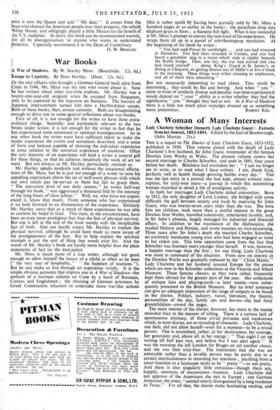War Books
F the two officers who brought a German General back alive from rete in 1944, Mr. Moss was the one who wrote about it. Now e has written about other war-time exploits. Mr. Hartley was a twenty-one-year-old sergeant when he escaped from Singapore, only to be captured by the Japanese on Sumatra. The horrors of Japanese imprisonment turned him into a Hertfordshire curate. Both of these books, then, arouse curiosity. Both are disappointing enough to drive one to some general reflections about war-books.
First of all, it is not enough for the writer to have done extra- ordinary things. Secondly, and particularly relevant to the two books under review, it is not enough for the writer to feel that he has experienced some emotional or spiritual transfiguration. As in any other book the writer .must have sufficient talent to make the reader experience the events and sensations described, and a sense of form and balance capable of showing the individual experience in some relation to the universal experience of mankind. Often the very intensity of an experience will lend a writer a natural .gift for these things, so that he achieves intuitively the work of art we want. But not always, as Mr. Hartley, particularly, reminds us.
• Mr. Hartley speaks modestly and without the occasional affecta- tions of Mr. Moss, but he is just not enough of a writer to raise his appalling experiences above the set of well-worn phrases with which our own minds pay lip-service to them but fail to grasp them. " The starvation level of our daily rations," he writes half-way through his book, " was aggravated a thousand fold by the intensity of the long hours of slave labour." Well, we, who have not experi- enced it, know that much. From someone who has experienced it we look forward to an illumination of the experience. Similarly Mr. Hartley states that as a result of these experiences he was able to confirm his belief in God. This must, in the circumstances, have been an even more prodigious feat than the feat of physical survival. But one is left at the end of the book merely with the inexplicable fact of both. One can hardly expect Mr. Hartley to explain the physical survival, although he could have made us more aware of the prodigiousness of the feat. But to help explain the spiritual triumph is just the sort of thing that words exist for. And the words of Mr. Hartley's book are hardly more helpful than the plain statements of fact on the dust jacket.
Mr. Moss is much more of a true writer, although not good enough to allow himself the luxury of a cliché as often as he does C' the very soul of hospitality," " the happiest of reunions "). But he can make us live through an experience vividly. It is the simple obvious accounts that impress one in A War of Shadows—the ambush of a German column on Crete by a band of Russians, Cretans and Englishmen ; the shooting of German prisoners by Greek Communists reluctant to undertake more war-like actions (this is rather spoilt.* laving been partially told- by Mr. Moss a hundred pages or so earlier in the book) • the parachute drop into elephant-grass in Siam ; a Siamese fish fight. What is less successful is Mr. Moss's attempt to convey the sum-total of his experiences. He wraps them all up in a parcel of sub-Hemingway mysticism. At the beginning of his book he writes : " You had read Proust by candlelight . . . and you had wintered in Honolulu. You had been stranded in Cannes, and you had heard a gondolier sing to a moon which rode in ripples beneath the Rialto bridge. Then, one day, the war had started and you had found yourself . . . doing King's Guard at St. James's, or dining at Chequers, or getting thrown out of Millie's at five o'clock in the morning. These things were either amusing or unpleasant, and all of them were interesting."
But not necessarily interesting to read about. They could be interesting ; they could be flat and boring. And when " you " came to write of similarly diverse and peculiar war-time experiences it would depend on " your " ability as a writer whether they had the significance " you " thought they had or not. In A War of Shadows there is a little too much plain nostalgia dressed up as something


































 Previous page
Previous page